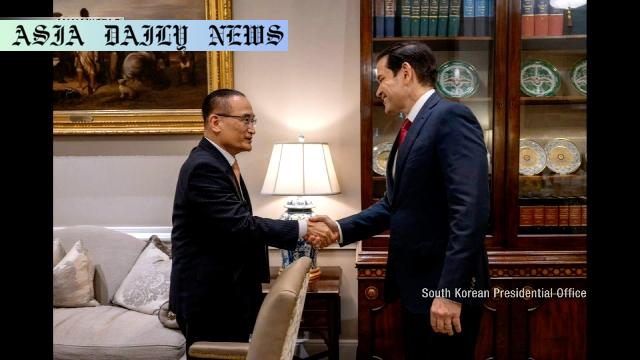Tariff: Officials in Seoul propose a bilateral summit in hopes of addressing the proposed US-imposed 25% tariff on South Korea.
The United States plans to impose a 25% tariff on South Korea effective August 1.
South Korean officials remain optimistic about a potential agreement with the US.
South Korea has proposed a bilateral summit to address the tariff and foster a mutually beneficial solution.
Japan is also facing similar tariff measures by the United States.

Background on the U.S. Tariff Proposal
The economic climate between the United States and South Korea has taken a contentious turn following the announcement of a new tariff. Set to go into effect on August 1, this proposed 25% tariff on South Korean exports has raised concerns both in Seoul and Washington. The measure, reportedly aimed at addressing trade imbalances, has left South Korea scrambling for alternatives to mitigate potential economic damage.
In recent months, the United States has adopted a more nationalistic trade policy. President Donald Trump, keen on reducing his country’s trade deficit, has used tariffs as a tool to force renegotiations and gain an upper hand in trade agreements. South Korea, one of the U.S.’s significant trade allies, now finds itself in the crosshairs of this policy shift. The economic consequences for South Korea could be considerable, as industries ranging from technology to automobiles would likely be affected.
South Korea’s Strategic Response
The South Korean government has moved swiftly to address this trade predicament. Following the issuance of a formal letter by President Trump to President Lee Jae-myung, South Korea has suggested holding a bilateral summit to discuss the issue. This proposal underscores the importance of diplomatic engagement, particularly in light of the long-standing alliance between the two nations.
In tandem with these diplomatic overtures, South Korean trade officials are ramping up discussions to seek a compromise. A potential agreement would not only help avert the looming economic challenges posed by the tariff but also reinforce democratic principles of dialogue and negotiation over unilateral action. South Korea’s willingness to engage and seek mutually beneficial solutions reflects its pragmatic approach to modern geopolitics.
Global Ripple Effects
This tariff proposal isn’t limited to South Korea alone. Japan, another key trade partner of the United States, has also been notified of the impending 25% tariff. While the focus remains on South Korea, there are broader implications for global trade relations. U.S. allies are increasingly finding themselves at a crossroads, balancing their economic and strategic relationships with the world’s largest economy.
The imposition of tariffs on allies such as South Korea and Japan could set a concerning precedent. If tariffs are implemented, they could compel these nations to explore alternative alliances or trade agreements, reducing economic dependency on the United States. This possibility makes the proposed bilateral summit between South Korea and the United States all the more critical.
The Path Forward
As the deadline for the tariff approaches, time is of the essence. Both nations have vested interests in maintaining strong economic ties. South Korea’s proactive measures and its commitment to open dialogue indicate a genuine willingness to resolve the differences amicably. However, the final outcome may largely depend on the United States’ approach to the negotiations.
A successful summit would not only strengthen bilateral relations but also showcase the power of diplomacy in resolving trade disputes in a globalized economy. Policymakers in Washington and Seoul must work together to find common ground, preserving the spirit of partnership that has long defined their relationship.
Commentary
Examining the Tariff’s Potential Impact
From a global perspective, the 25% tariff proposed by the United States has the potential to disrupt established trade relationships. South Korea, as one of America’s key economic partners, finds itself in a precarious position. The tariff could lead to significant repercussions across industries, from technology and automotive exports to supply chain dependencies. This proposal not only threatens economic stability but also raises questions about the future of international trade cooperation.
South Korea’s Pragmatic Approach
South Korea’s reaction to this situation has been notably constructive. By proposing a bilateral summit and expediting trade discussions, the nation demonstrates its commitment to resolving conflicts through dialogue. This pragmatic stance sets a positive benchmark for addressing global trade disputes. It underscores the importance of seeking mutually beneficial outcomes rather than resorting to retaliatory measures, which could further escalate tensions between nations.
Room for Strategic Diplomacy
The ongoing discussions provide an invaluable opportunity for both sides to showcase the strength and value of strategic diplomacy. South Korea’s National Security Advisor Wi Sung-lac’s meeting with U.S. Secretary of State Marco Rubio highlights the emphasis on high-level engagement. Hopefully, the proposed summit will offer a platform for candid discussions, where concerns about tariffs can be addressed in a spirit of mutual understanding and respect.
A Call for Collaborative Solutions
The broader implications of this tariff issue are not limited to South Korea alone. Trade policies that disrupt alliances have the potential to alter global transaction flows. Both the United States and South Korea have much to gain from maintaining a robust partnership. Collaborative solutions, developed through direct dialogue and mutual concessions, could not only resolve this immediate issue but also pave the way for a stronger and more resilient economic alliance moving forward.


